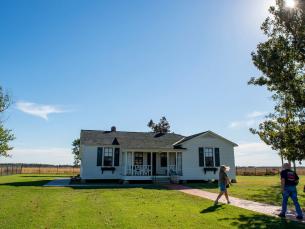Dewitt
Located in the southeast region of the state in Arkansas County, DeWitt lies about 53 miles east of Pine Bluff and is a stop on the Great River Road National Scenic Byway. An Indian village until 1816, DeWitt was selected as the county seat in 1852, after Arkansas Post was deemed to far from the center of the growing population. It is one of two county seats – Stuttgart being the other – a typical practice in several Delta counties where travel across the county was obstructed by swamps, rivers, and forests.
DeWitt was platted as a townsite in 1854. Slips of paper were drawn to determine who would get to pick the name. Surveyer Adam McCool won the right and chose to honor DeWitt Clinton, a New York politician and sponsor of the Erie Canal.
A mural titled “Contemporary Portrait of DeWitt,” is one of 21 post office murals commissioned for the State of Arkansas between 1938 and 1943 to beautify communities and support out-of-work artists as part of the New Deal. Artist William Traher, selected for the DeWitt project, made sketches of the people and the community, which he used to create his mural.
Frank Glasgow Tinker, a “flyer of fortune” during the Spanish Civil War, attended high school in DeWitt. While in Spain he became acquainted with Ernest Hemingway, who based his short story, “Night Before Battle,” on Tinker. He apparently committed suicide at age 30 in the Hotel Ben McGehee in Little Rock, though the cause of his death has been questioned. Upon hearing the news, Hemingway wrote to his mother-in-law, Mary Pfeiffer of Piggott, that had he known of Tinker’s mental state, he would have tried to talk him out of it. Hemingway himself committed suicide in 1961.
Another of DeWitt’s famous citizens – or more accurately infamous – was Helen Spence, a teenager who smuggled a gun into the courtroom where her father’s accused killer was being tried. Convinced he was going to be acquitted, she shot him. Though convicted of his death, her conviction was overturned by the Arkansas Supreme Court and she was freed, only to then murder a man she claimed was harassing her. This time she went to the State Farm for Women, but after an attempted escape, she was shot by a prison trusty guard. Her death was ruled self-defense, though she was shot in the back of the heard.















